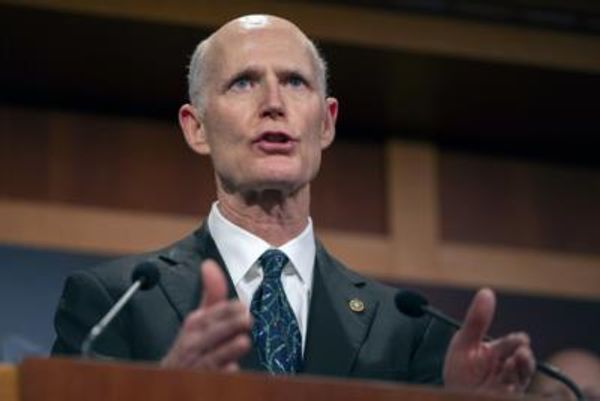
Poland is under attack from both east and west. Foes in Berlin and Moscow, using their proxy Donald Tusk, plan to destabilise the country, overrun it with uncontrolled migration and subjugate Polish politics to external influence.
That, at least, would be the view of someone who received all their news from Poland’s public television channel, TVP, where correspondents and anchors on the nightly news programme parrot government talking points and warn of the dangerous goals of the political opposition.
“Brussels’s attacks on Poland are inspired by the opposition,” said a news anchor last week, before cutting to a story claiming Germany is financing NGOs helping to bring illegal immigrants to Europe and several more stories about the nefarious doings of Tusk during his previous term as Polish prime minister.
Anchors speak daily about an “invasion” of Europe by migrants, and the current government’s brave measures to stop it. Scandals involving the government are ignored.
As Poland enters the final week of campaigning before a crucial parliamentary election, the role of public television in the bitterly polarising campaign is under scrutiny.
The election next Sunday will see the ruling Law and Justice party (PiS) try to retain power for a third term, challenged by an opposition coalition led by former prime minister and European Council president Tusk.
Polls have consistently shown PiS likely to win the most votes, with one by the Kantar agency last week putting them on 34% against 30%. However, the outcome of the election is likely to hinge on the fate of several smaller parties, which will determine who is able to form a coalition and govern. The margins are tight and most believe it’s too close to call. PiS, a nationalist, populist party, has been accused of rolling back democratic norms during its eight years in power, as well as curtailing reproductive health rights and demonising minorities. Soon after taking power in 2015, PiS moved to bring public television and radio, meant to be neutral and pluralistic, under political control.
Dorota Nygren, a journalist with more than two decades’ experience, was working as an output editor on public radio’s international desk when PiS took over in 2015. She said there was soon pressure to present the news in a way that chimed with government talking points, such as talking up the dangers of immigration.
“I saw my colleagues adapting very quickly to becoming the PR agency of the government,” she said. She got into open conflict with her bosses when working on a story about a man who had spat at a priest in Italy.
“The story was hardly newsworthy, we don’t write on every small thing that happens everywhere, but there was a request for this material,” she said. She took out a reference to the man’s ethnic origin – Moroccan – because she thought it irrelevant to the story. She was then called into the editor’s office, and demoted to working in the radio archive.
As the years went on, the bias became more pronounced. “The public media have been fully converted into a propaganda arm of the ruling PiS and acts not only to promote the interests of the party but also to attack and denigrate its critics,” a report released on Thursday by the European Centre for Press and Media Freedom found.
Research by a Polish media monitoring agency found that in a two-week period at the end of September, TVP showed PiS campaign adverts in their entirety 179 times. Meanwhile, coverage of Tusk’s campaign has been almost entirely negative.
In one recent incident, the channel cut away from an interview with an opposition politician to broadcast footage of the prime minister, Mateusz Morawiecki, eating a cake. Other coverage is more sinister: late last year Tusk tried to sue the channel for repeatedly showing images of him outlined in a red glow with what appeared to be a gun sight on his chest. Earlier this year, the 15-year-old son of an opposition politician ended his own life after a report on a local public radio station that made it possible to identify him as the victim of child abuse.

Radosław Sikorski, an MEP from Tusk’s Civic Platform party and former foreign minister, described the output of public media as “Goebbelsian”. Although many Poles get most of their news from the internet, TVP’s evening news programme is still watched by around two million people, particularly in smaller towns and rural areas, the PiS heartland.
Many government figures will privately admit that public television is staunchly politicised, but claim this is merely a counterbalance to liberal private channels, and that during the previous rule by the current opposition, television was equally skewed in the other direction.
Independent observers say there is some truth to the accusation that public television has always been politicised. Dominika Bychawska-Siniarska, a lawyer and human rights advocate, said: “Whenever there was a new government coming into office there were huge shifts and changes in the public media.” However, she conceded PiS had gone immeasurably further than its predecessors. “What happened in 2015 is without precedent – both the scale and the way it was done,” she added.
Part of the PiS strategy for the media has involved putting political appointees into roles that are meant to provide independent oversight, such as the five-person board of the National Broadcasting Council, which has proved toothless in keeping TVP in line.
“There’s no discussion about public media. They don’t want to discuss, analyse or criticise public media, because it’s absolutely subordinated to Law and Justice,” said Tadeusz Kowalski, the only member of the board to be nominated by the opposition-controlled upper house of parliament, in an interview at the council’s headquarters.
Kowalski, who has been a journalism professor for more than four decades, said meetings of the broadcasting council are usually perfunctory and rarely deal with substantive issues. The council has also been accused of stalling on renewing the broadcast licence of the largest private television network, TVN, which expires in April.
“I have made five requests to include this on the agenda of our meetings and they have rejected it. The others don’t present any official decisions why. The problem is not legal, it’s political. TVN is salt in the eye for them,” he said.
The broadcasting council did not reply to a request for comment.
If PiS wins a third term in office, Poland’s independent journalists expect the country’s media environment to continue worsening. If the opposition win, they have promised to bring an end to the hatred and propaganda.
At a campaign rally, Tusk was asked by a supporter what he planned to do with TVP in the event he became prime minister. He answered that while he did not want to reveal the details, there are “legal mechanisms” to bring back control over public television overnight.

“We will need exactly 24 hours to turn the PiS TV back into public TV. Take my word for it,” he said. He added that anyone who thought this might sound like an attack on journalism was wrong: “It’s been a very long time since anyone has seen a single journalist on PiS television.”
Freedom of speech advocates said it will be a challenge to ensure public television really is neutral.
“I don’t think it could be as bad as it is now, but still many of us fear there would be business as usual,” said Bychawska-Siniarska. “After all, it’s really convenient to have public media that is favourable to you,” she said.







